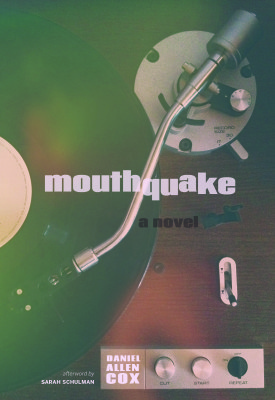Employing a variety of experimental techniques in style and structure, Daniel Allen Cox’s fourth novel, Mouthquake, details the queer coming-of-age of a stuttering young man in Montreal. Mouthquake is divided into two sections, each focusing on a significant relationship in the unnamed narrator’s life: a friendship with a Montreal legend and a later romance with a sensitive young man. Woven through the novel is a third relationship, between the narrator and his hometown of Montreal. The city is central to the protagonist’s development and connects the book’s two very different narratives.
The story opens in the late 1970s. It is winter and the city is “a nonstop blizzard,” heavy snowfall wreaking havoc. A fan of The Littlest Hobo, the child protagonist leaves home in the snow, hoping to find the show’s star. Instead, while wandering the city streets, he stumbles into an unlikely friendship with a five-hundred-pound strongman and self-proclaimed Champion du monde. The narrator refers to Grand Antonio as his “imaginary friend,” but Montrealers will recognize that this larger-than-life figure is based on the real Antonio Barichievich, a fixture of the city in the late twentieth century, famous for once pulling four busses full of passengers down Sainte-Catherine Street. Although he is eccentric and down on his luck, Antonio is depicted by Cox as a good-natured outsider, a symbol of a time when the city was more open to strange characters.

Mouthquake
Daniel Allen Cox
Arsenal Pulp Press
$15.95
paper
208pp
9781551526041
By 1994, when the second section of the novel picks up, the city has lost some of its glamour. Now in his early twenties, the narrator is living a Bohemian lifestyle on the Plateau. By night he indulges in a decadent world of sex and drugs, and in the daytime
he volunteers at McGill’s community radio station CKUT. In the intervening years he has become a rabid music fan, obsessing over bands. (Cox’s eloquent apotheosis of New Order’s hit single “Regret” is a treat.) When he finds love with a young man named Eric, who is deaf, the narrator is forced to reflect on his devotion to sound, even as Eric tells him that he can hear music, too, “just differently.” The novel charts their romance through the various stations of young love, from exploratory sex to arguments over grocery shopping.
Cox’s depiction of Montreal in the 1990s is surreal and dreamlike. If the first section of the book was tinted with the sepia tone of nostalgia, in the second part, the city appears as if seen under the influence of psychedelic drugs and young love – both of which can powerfully alter perception, and have volatile emotions as side effects. Cox’s bricolage style and short scenes reflect the disjointed experiences of late adolescence. Eschewing the conventions of realism, Cox uses a range of experimental techniques to explore his narrator’s inner world, including daydream cameos from dead celebrities, stand-alone meditations on religious and sexual proclivities, lists of favourite bands, and BDSM-fuelled reveries. Some of these are more successful than others at giving us real insight into the protagonist’s character. Nevertheless, Mouthquake is a compelling portrait of a queer young man and a city changing together. mRb






0 Comments